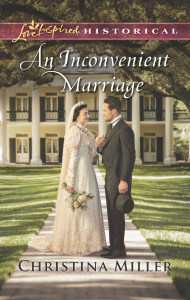by Christina Miller, @CLMillerbooks
Some days, the words spill out faster than we can type. We’re laying down our word count like a master—and then, all of a sudden, the creative flow stops. Every word, phrase, or sentence we think of feels stale, overused, boring.
We’re stuck.

These are the times when an author needs a little help. The good news is that, instead of staring out the window or rooting around in the pantry for the Dove chocolates, we can pull out a few tricks and quickly get unstuck. Here are some of my best tips for pulling yourself out of the muck:
1. Stuck in dialogue: Need a funny, poignant, ironic, or sarcastic line of dialogue, but it just isn’t coming to you? Space down a few lines and start brainstorming, writing down every possible solution you can think of, one after the other. Write down the bad or obvious ideas first, to get them out of your head. Go as fast as you can and keep going until the perfect answer comes to you. This works because creativity breeds creativity. By working fast and writing down every single idea, we quickly reach the bottom of the page and the perfect solution.
The first time I used this method was in an early, unpublished manuscript set in the Roaring 20s. A Chicago gangster was in love with the heroine, and when he returned from a business trip, he asked if she’d missed him. She was relying on him to help her meet her story goal, but she also wanted to discourage his attention, so she needed a snarky answer. My process—getting the bad ideas out first—looked something like this:
Vincent: “Miss me?”
Eva: “No, I didn’t miss you.”
“I never miss you when you’re gone.”
“I’d never miss you.”
“I wouldn’t miss you if you were gone all year.”
That line led to the line I used:
Eva glanced at the handgun in his shoulder holster. “Trust me. I wouldn’t miss.”

2. Stuck in the middle of a scene and not sure how to get to the end: Genius author James Scott Bell says to pick up a novel, close your eyes, turn to a random page and use the first word you see. (If it’s an article, preposition, or conjunction, use the next word.) The first time I used this method was while I was writing my first published book, Counterfeit Courtship. In it, the heroine was about to see the hero for the first time since she realized she loved him. I opened an older romantic suspense book by Susan May Warren, and the first words I saw were a dialogue line: “Go, go!” At first, since no one was on the run or in danger in my scene, I didn’t think it would work. But it didn’t take long to think of a way to use it, and it improved the whole scene. Here’s how it worked:
Graham gestured at her dress. “I assume you want me to come in and tell you, but I doubt I could get past those skirts.”
Ellie moved inside so he could pass through the doorway, unhindered by hoopskirts. On second thought, she needed to examine these new emotions of hers before she could trust herself to be alone with him and not blurt out something silly. The front gallery would be safer, out in public as it was. She waved her trembling hand at him as if shooing a fly. “There’s a nice breeze. Let’s sit outside.”
He hesitated. “We don’t want anyone to overhear. I have some rather private things to tell you—”
“Go, go!” She pushed at his shoulder.
“Ellie, what is the matter with you?”
So much for not sounding silly.
3. Stuck at the end of a scene: My friend and critique partner, the fabulous Laura Hilton, says when you’re stuck, have somebody pull out a gun. Think that won’t work for the romance genre? Especially for an ultra-conservative publisher like mine? Well, this is the advice Laura gave me when I couldn’t figure out my black-moment scene ending in An Inconvenient Marriage. Here’s how it worked: Samuel’s late wife, Veronica, had loved another man. When Samuel had tried to tell her he loved her, Veronica had said the very words Clarissa (heroine) says in this scene. And both times, the woman he loved had fled from the room: (This is Clarissa’s POV)
He lowered his gaze to the floor. “I … have something to tell you …”
Say it!
“I—well, I care for you a great deal, Clarissa.”
She saw through his hesitation to his fear. He merely needed a little help. “Samuel, do you mean you love me?”
Samuel’s head shot up, his eyes wide but not with pleasure. “What—what did you say?”
His sudden look of horror ripped through her heart. Had he not meant to profess his love?
He held up one hand, his head slowly shaking.
No. No, he had not. Not at all—
Sudden movement outside the window caught her attention. Grandmother, running across the lawn, her hands gesturing wildly above her head.
Absalom in the camellia garden, waving a gun at her.
“Oh, no—”
Clarissa turned and shot out of the room and down the stairs, letting the little valentine slip to the floor.
Of course, this doesn’t have to be a literal gun. It could be any unexpected, dramatic event. A sudden storm, a startling revelation, an intruder, or a vehicle accident could work just as well.
Getting stuck doesn’t have to mean staying stuck. Writing isn’t quicksand. Use these three tips and watch your words start to flow again.
Widowed reverend Samuel Montgomery is excited to start over with his daughter in Natchez, Mississippi—until he learns he’ll lose his job if he doesn’t marry. His solution: a marriage in name only to heiress Clarissa Adams, who needs a husband to win her inheritance. Though the beautiful music teacher will make a good wife, Samuel doubts he can ever truly capture her heart.
Marriage satisfies only the first provision of Clarissa’s grandfather’s will, which pits her against her cousin. And fulfilling the remaining stipulations won’t be easy between caring for Samuel’s rebellious daughter and managing an orphanage. But Samuel seems determined to stand by her side…and maybe even prove their marriage could be more than just convenient.

Author Christina Miller’s idea of a perfect day involves a southern beach, a stack of books, and a glass of sweet tea. Ten years ago, she left her job as an RN to work in the church her husband pastors. She also became a writer—and sometimes she gets to work on the beach.
Christina is a Bethany Global University (Bloomington, Minnesota) graduate with degrees in theology and missiology, a church secretary, worship leader, and children’s ministry teacher. When she doesn’t have her nose in a book or her toes in the sand, you might catch her visiting an antebellum mansion, opening her early-American home for Dinner Church, or teaching at a women’s conference. Christina lives on her family farm with her husband of thirty-two years and Sugar, their talking dog.
